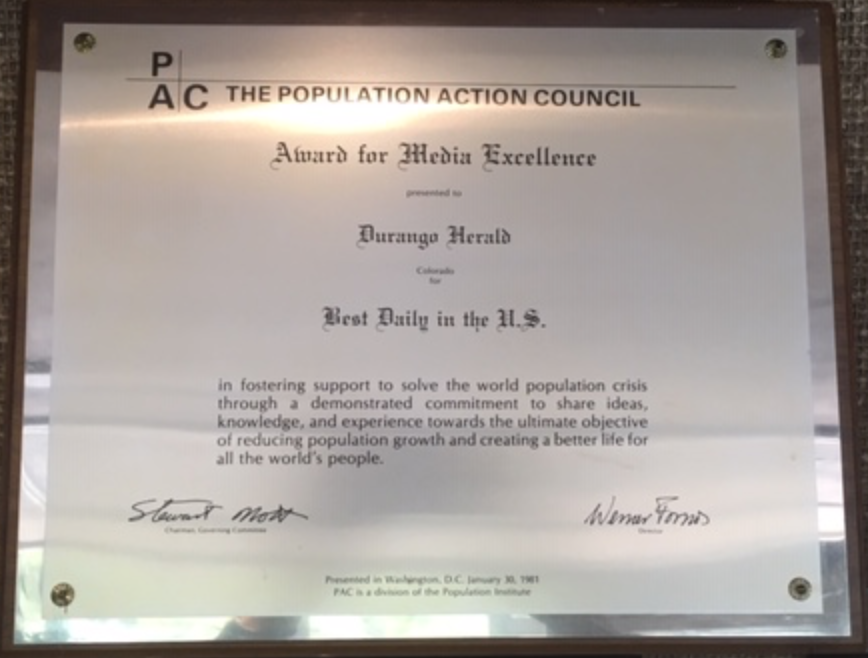
Sometimes happenstance can make a large difference in one’s life. Deciding to move to Durango in 1976 was a stroke of good luck, partly because of Morley Ballantine’s presence here.
My concern about human population goes back many years, and received encouragement from many mentors, including my parents. A chance meeting with a man from India helped me solidify my goal. It was just before college graduation and I had been accepted into medical school. I told him that I was going into medicine because of concern about overpopulation. “Come to India” he replied; “we need you.”
Instead of India, we moved to Durango. Gail and I were married 2 days after she completed her graduate degree in teaching and I had finished my first year of medical school. Our 2 sons were born in New Mexico–Dave in Taos, where I was in general practice, and Bryan in Albuquerque, where I did specialty training in OB-GYN.
We decided that Durango was the best place to raise our two boys, although it was not the most lucrative offer I received–my starting salary was $24,000 a year. While we didn’t know it when we made the decision, we were not the only people concerned about population in this town. The first hint came when small group got together a few times to discuss the issue–that is how I first met Morley Ballantine.
Another population activist, John Byrd, suggested that we go with the Population Institute to the UN’s International Conference on Population and Development in 1994. It was a huge affair held in Cairo, Egypt with 179 governments participating and tens of thousands of people attending hundreds of events. Somehow, John managed to finagle a personal meeting with Under Secretary Tim Wirth. The former US Senator from Colorado, Wirth was in charge of the USA’s delegation to the conference. We told Wirth that we were able to obtain press passes with the help of the Durango Herald. Wirth paused for a couple of seconds then asked “How is Morley Ballantine?” I’m not sure if Wirth had ever been to Durango, but he certainly knew who ran the Herald! Morley’s influence extended far beyond Durango, and even further than Denver.
I knew that the Herald won an “Award for Media Excellence” from the Population Institute in 1981. Remembering this, Morley was the first person I thought of when I had an inspiration.
Twenty-five years ago Gail and I were driving home from listening to Paul Ehrlich speak on human population. He (with is wife, Ann,) had written the best-selling “Population Bomb”. I pulled over to share my brainstorm with Gail. I told her: “We could write a book like the very popular “green” book, “50 simple things you can do to save the earth”, but call it “50 simple things you can do to prevent overpopulation”. During the rest of the drive home together we came up with 17 possible chapters.
Morley wasn’t able to help with publishing the book, but what she offered instead turned out to be much better. She agreed to serialize the book in the Herald, a chapter at a time. She proposed that I own the copyrights of the essays/chapters for future use in a book. I would get paid less than the going rate, and I’d donate that money to Planned Parenthood. When there were enough columns it would be easy to compile them into the book.
Morley’s foresight still amazes me. By owning the copyrights to the articles, I can control what happens to them. For the past 14 years they have been posted on my blog, www.population-matters.org. Many of them have been reprinted by other organizations, such as the British nonprofit organization, Population Matters (they copied my choice of name). I also send out these monthly essays to more than 350 people in many different countries.
Bill Roberts was my first editor at the Herald, although Gail has always been my first editor. Bill guided me with a gentle hand. I used to be verbose and exceeded my allotted count of 750 words. He sent me a gentle reprimand–just as he did when I strayed from the topic.
I haven’t given up the idea of writing a book on aspects of human population, but have realized that a collection of re-worked Population Matters! essays would not sell well. My current plan is to include some essays and intermix them with stories from my 40 years of experience as an OB-GYN. What do you think? Please let me know.
©Richard Grossman MD, 2020